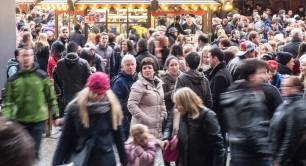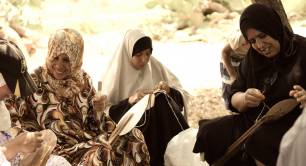Eat, drink and be ethical – 'tis the season for conscious Christmas consumption
The Christmas season is upon us and with it comes not just mulled wine and jingle bells but an overwhelming, and unsustainable, wave of consumption. Could we potentially use our purchasing power this Christmas to do some good, not just for our loved ones, but for society at large?
UK consumers are estimated to spend £16.5bn on Christmas shopping this year, and £3bn has already been spent over the Black Friday/Cyber Monday weekend. Despite some signs of Black Friday fatigue, with Asda not taking part this year, and US outdoor retailer REI closing all 143 stores and encouraging its staff and customers to “spend time outdoors”, overall Christmas shopping spend remains on the rise, up 2.5% on last year in the UK.
Our increasing consumption, not just ahead of Christmas, means we’re producing more and putting more pressure on natural resources. It simply isn’t sustainable. Take fashion for example. Globally, we buy 80 billion new items of clothing each year but with the rise of fast fashion a lot of it ends up in the back of our wardrobes unused and 350,000 tonnes of used clothing goes to landfill in the UK every year. We’re also seeing cheaper prices and, consequently, worsening working conditions for the people, mainly young women, who make our clothes.
It's easy to blame the big bad corporates but as consumers we’re equally responsible. A key issue is how little we actually know about the products we buy – who made them and what impact has the production had on society and the environment? Transparency is key in this matter and consumers are increasingly becoming more demanding, challenging companies to disclose their triple bottom line.
Research carried out by Nielsen last year showed that a majority of global consumers would pay more for products created by companies with a positive social and environmental impact. Similar research by YouGov a couple of years earlier showed that 69% of UK adults would buy ethical products if they were more widely stocked, which highlights the problem of supply, and lack of awareness.
Ethical grocery shopping is made easier by labels such as ‘fairtrade’ and ‘organic’ but when your shopping list goes beyond chocolate and milk it’s a bit of a struggle. There are initiatives looking to change this, helping you make conscious, better choices.
Companies like People Tree present an alternative to fast fashion with fair working conditions and organic materials. B Corporations like Elvis & Kresse are promoting ways of using business as a force for good with a focus on the triple bottom line. The Lost Lanes stocks a wide range of ethical and sustainable products, This Because tells us to think before we shop, and Social Enterprise UK are encouraging consumers to buy social. This year they’ve also launched this Christmas site, showcasing social enterprise goodies for the festive season.
I’m hearing of more people doing family Secret Santa, essentially only buying one present to one member of the family. And big charity campaigns are making us think of ways to help this Christmas, whether that’s providing aid for refugees in need or making sure no one’s having to spend Christmas alone.
The employment and tax generated by retail is important to the economy so we probably can’t stop consuming altogether any time soon, but we can make conscious decisions. We can ask where our products were made, and we can demand fair pay for those that made them. We can question how sustainable a product is, and we can choose one that will last longer. We can encourage positive social impact, and we can use our purchasing power to make a difference.
Photo credit: Cat Sanchez



